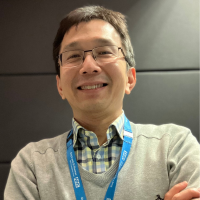 What is your name and job title?
What is your name and job title?
I'm Ming Lim and I'm a paediatric neurologist.
What made you pursue a career in neurology?
I was actually an adult neurologist in the making but during my paediatric placement as a third year medical student, I was inspired by one of the greatest paediatricians and educators, Sir David Hull. He taught me so many things about caring for children but also that excellence was meaningless without humanity and humility.
How did this lead to heading up the research and development team at Evelina London?
After completing my paediatric neurology training and a dedicated period of research looking into a rare form of childhood neurodegenerative condition called Batten disease, I was delighted to be offered a consultant position at the Evelina London (I won’t tell you when!). I balanced a busy full-time clinical position with clinical research, like so many of the clinicians at Evelina London. I helped the children’s neuroscience department to develop a strong research footprint so in 2020, when the opportunity came up to be research and development lead for Evelina London, I jumped at it.
What does your job involve?
Fundamentally, the most important aspect of this job is to make sure Evelina London continues to have the highest level of participation in paediatric research. We are currently in the top 3 nationally, particularly clinical trials, and we know that this is what drives clinical progress. Evelina London now participates in over 200 studies across 23 paediatric subspecialties and 30% involve an investigative medicinal product. A second aspect of the job is to develop Evelina London into a research hospital where many more of our clinicians lead studies that our children participate in, and every child we see is involved in or has access to these studies.
Why do you love your job?
The most refreshing and exhilarating thing about this job is learning about the other conditions that other clinicians research, beyond my very narrow field of childhood neurology. Not a day goes by where I am not amazed by how much important research is happening at Evelina London.
What are the most important areas to focus on, when it comes to rare neurological disorders in children?
My current research focus is very rare childhood neurological conditions where inflammation and infections feature. These conditions are so rare that any progress can only be achieved by international collaborations. Evelina London has led and contributed to a growing number of international management consensus, which are crucial in ensuring that children are broadly treated in the same and the best way possible.
Many conditions in childhood neurology are individually rare but by finding common themes within these conditions, we are able to leverage more support for research. I recently led the British Paediatric Neurology Association (BPNA) and the James Lind Alliance Research Priority Setting Partnership, where children, their parents, clinicians and the wider community looking after children with neurological disorders, identify and prioritise research themes.
What are your proudest moments?
Like most clinicians involved in research, I recall 3 main things. The first competitive fellowship I was awarded to complete my doctoral studies, my first National Institute for Health and Care Research (NIHR) grant to perform a multicentre random controlled trial called STRIVE study (thanks to all who were part of this team), and when a doctoral student I supervised and mentored was awarded a young researcher award. But the opening of Wolf Clinical Research Facility in Evelina London Children’s Hospital is certainly the most tangible and proudest moment of my career.

Thank you to the children and young people who have so brilliantly illustrated our blog pages.